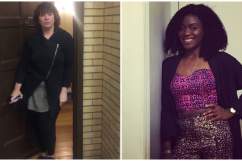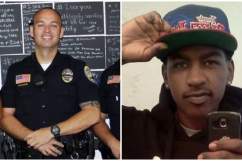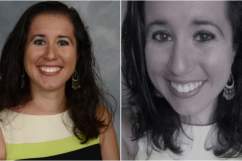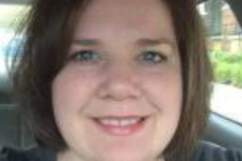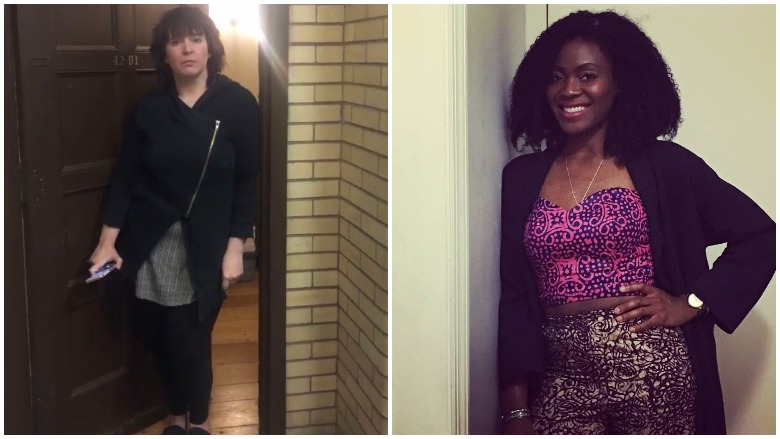
Facebook Sarah Braasch, left, called the police on Lolade Siyonbola, a black Yale graduate student who was napping in her dorm's common room.
A white woman at Yale University called police on a black graduate student who was napping in the common room of her own dorm in the latest in a string of incidents of white people calling 911 on people of color for questionable reasons. Video of the Yale incident has gone viral after it was posted to Facebook on May 8 by the graduate student. Yale has called the incident “deeply troubling” and reaffirmed the university’s commitment to addressing incidents of “racial bias, discrimination and harassment.”
Sarah Braasch, a 43-year-old studying for her Ph.D in philosophy at Yale, called police on Lolade Siyonbola, during an incident at the Connecticut university’s Hall of Graduate Studies. Siyonbola recorded her interaction with Braasch and the Yale Police officers who responded to the 911 call. According to the Yale Daily News, this week’s incident was not the first time Braasch reported a black student for being in her hall. Jean-Louis Reneson, told the newspaper that he filed a complaint against Braasch in March after she called the police on him because she did not believe he was a student after he came to the building for a meeting with Siyonbola and other students.
Braasch could not be reached for comment by Heavy. Here’s what you need to know about her and the incident:
1. Braasch Told Siyonbola, ‘I Have Every Right to Call the Police, You Cannot Sleep in That Room,’ but Yale Says Officers ‘Admonished’ Her for the 911 Call
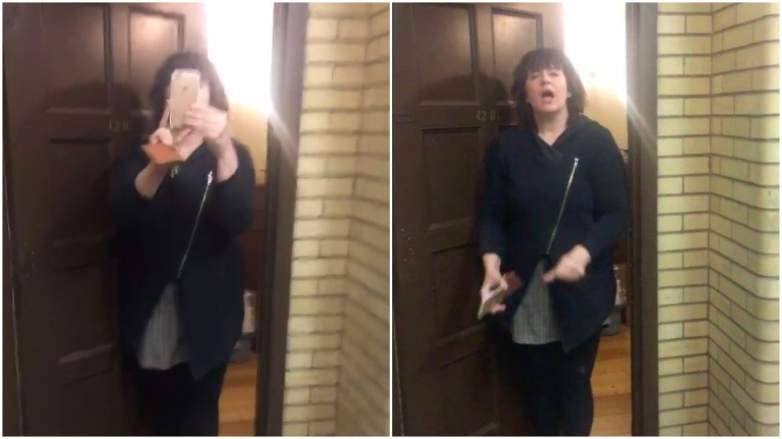
Sarah Braasch.
The incident happened on Tuesday, May 8, at 1:40 a.m., Yale University Police Chief Ronnell Higgins said in a statement. A woman called police to say that she was a student and there was a woman sleeping in the common room on the 12th floor of the Hall of Graduate Studies. Higgins said the caller told police she didn’t know who the person was. Officers responded at 1:45 a.m. and met with the caller, who showed them her ID. She then let them up in the elevator and they stopped at the 5th floor, where the other student appeared.
“At this point, the caller pointed to the other student and said ‘This is her,'” Protocol is for police to separate the parties involved, so two officers stayed with the woman on the fifth floor and the investigating officer went with the caller to the 12th floor,” Higgins wrote. “The investigating officer spent over 11 minutes initially with the caller to assess the situation, while the other two officers spent about 15 minutes with the other woman to assess the situation and to confirm her identity. After reviewing the scene in the 12th floor common room and seeing a computer, books and notebooks in addition to a blanket and pillow on the couch, the investigating officer determined that the person who had been sleeping in the common room was likely a student, so the officer asked the caller to wait in her room on the 12th floor.”
In the first video posted by Lolade Siyonbola, 34, who is set to graduate with a master’s degree in African studies in 2019, shows Sarah Braasch standing in the doorway of her room with a phone in her hand. Braasch can be seen taking photos of Siyonbola and then she tells her, “I have every right to call the police you cannot sleep in that room,” before taking more photos. Siyonbola wrote, “Sarah Braasch, Philosophy PhD student, called the cops on my friend a few months ago for getting lost in my building. Today she messed—again—with the wrong one.” You can watch the video below:
In a second video, Siyonbola, who had been studying for finals, can be seen interacting with the Yale Police officers who responded to Braasch’s call. In the second video, she can be heard telling the officers, “I deserve to be here. I paid tuition like everybody else. I am not going to justify my existence here. I am not going to be harassed.”
Siyonbola told the officers, “I was sleeping in the common room and [Braasch] comes in and turns the lights on and was like, ‘Why are you sleeping here? You’re not supposed to be sleeping here. I’m going to call the police.'” The officers requested her ID and eventually confirmed it after she reluctantly gave it to them. She also showed them that she had a key to open her apartment. “I really don’t know if there’s a justification for you even actually being in the building,” Siyonbola said in the video.
Higgins, the Yale Police chief, wrote, “The investigating officer reported what she found to the other two officers on the fifth floor and a supervisor who had arrived to assess the situation and determine whether assistance was needed. The officers were having a difficult time confirming the other student’s identification due to the use of a preferred name in the system that was different from the official name on the ID. The supervisor worked with dispatch and security to clear up the matter, taking down the student’s information and giving her a case number. The assessment of the ID took about 15 minutes, which is longer than usual.”
You can watch the video below:
Higgins wrote that after the ID issue was cleared up, “the investigating officer, with her supervisor, went to the 12th floor where they spoke to the caller again for another 7 minutes. Another officer also followed. They informed the caller that the student who had been in the common room was an authorized resident and had every right to be there. They also explained that this was not a police matter and were reporting the incident to the dean of the Graduate School of Arts and Sciences. Officers left HGS Studies at about 2:34 a.m.”
Yale’s Vice President for Student Life, Kimberly M. Goff-Crews said in a statement. ” I am deeply troubled by an incident that took place Monday night in the Hall of Graduate Studies. One graduate student called the police to report another student in the common area, who had every right to be there. The Yale police officers who responded spoke with both parties and subsequently admonished the complaining student that the other student had every right to be present.”
Siyonbola told the Yale Daily News that the May 8 incident wasn’t her first run-in with Braasch. In February she invited a group of graduate students to her dorm for a meeting in the common room. Jean-Louis Reneson, a black grad student, told the Daily News that he got lost in the building when he arrived and was “physically blocked” from entering the common room by Braasch after he asked her for directions. Reneson and Siyonbola filed a complaint about that incident with Yale’s Associate Dean for Graduate Student Development and Diversity Michelle Nearon. The Daily News obtained a copy of that complaint.
Reneson said Braasch did not appear to think he was a Yale student and accused him of being an intruder. “Feeling ignored, I went down to the base of the twelfth floor and eleventh floor and turned my back, but she continued to verbally assault me from the twelfth floor claiming that I ‘didn’t belong here’ and I was making her ‘uncomfortable,’” Reneson told the newspaper. He said Braasch left and Reneson went to the meeting, but four officers soon showed up to investigate a “suspicious character.” They quickly established Reneson was a student invited to the building by Siyonbola and left, the newspaper reports.
“[Cooley] just finally sent me an email to discuss it,” Reneson told the Daily News. “It’s her job to know these things, but now it’s damage control.”
In their complaint, Reneson and Siyonbola said that calling police on Reneson, and other “acts of micro-aggression and psychological violence,” at Yale leave many black gradaute and professional students feeling unsafe.
Yale Graduate School Dean Lynn Cooley said in an email to students on Wednesday, “Incidents like that of last night remind us of the continued work needed to make Yale a truly inclusive place. I am committed to redoubling our efforts to build a supportive community in which all graduate students are empowered in their intellectual pursuits and professional goals within a welcoming environment. An essential part of that effort must be a commitment to mutual respect and an open dialog.”
Goff-Crews said in her message to graduate students that she will be holding listening sessions along with Yale’s police chief and Cooley:
As Vice President for Student Life, I have worked with administrators, faculty and students to strengthen the resources available to address incidents of racial bias, discrimination, and harassment. This incident and others recently reported to me underscore that we have work to do to make Yale not only excellent but also inclusive. I strongly believe we must strive to create an environment that values equity and justice and in which all students are empowered to pursue their personal and professional goals — environment that is diverse, intellectually challenging, and broadly welcoming. Over the last 48 hours, I have been in discussion with Dean Lynn Cooley, Chief Ronnell Higgins, and other university staff, including Yale police, to better understand what exactly happened at HGS on Monday night, and how we can work together to avoid such incidents in the future.
We still have so much more to do.
Siyonbola graduated from the Univeristy of Missouri with a degree in computer science and worked in the tech industry in New York City before enrolling at Yale, according to the university’s website. “Lolade founded the Yoruba Cultural Institute and the Nollywood Diaspora Film Series and served as Arts & Culture Editor, then Editor in Chief of Applause Africa magazine. A spoken word artist, Lolade has performed internationally and published her first book, Market of Dreams in 2012. At Yale, her research focuses on the relationship between migration on identity formation, particularly among millennial first-generation Americans, and the role that cultural devices like language, film and textiles play in the preservation of culture. Lolade is a Foreign Language and Area Studies Fellow,” Yale’s website states.
Siyonbola told the Yale Daily News, “The response from Dean Cooley has been terrible. I don’t remember receiving any sort of apology or anything from her the first time, and this time the email that she sent was very vague, just not decisive, it just wasn’t direct with what the actual issues are. Do you want black students at Yale or do you not want black students at Yale? If you do, then be very clear about taking decisive action so incidents do not continue to happen. We don’t want to wait for a fatality … before actual action is taken on this.”
On Facebook, Siyonbola wrote, “Grateful for all the love, kind words and prayers, your support has been overwhelming ?? Black Yale community is beyond incredible and is taking good care of me. I know this incident is a drop in the bucket of trauma Black folk have endured since Day 1 America, and you all have stories.”
You can learn more about Lolade Siyonbola at the link below:
2. Braasch Is a Lawyer, Worked for a Women’s Rights Organization & Began Studying Philosophy to ‘Address the Sub-Human Legal Status of the World’s Women’
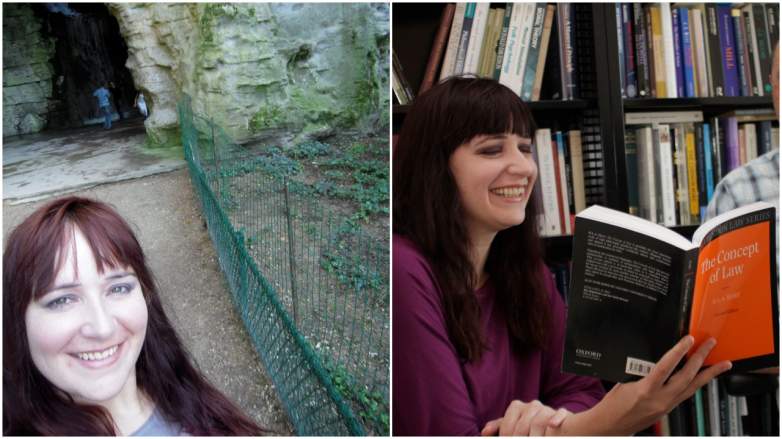
Sarah Braasch.
Sarah Braasch is scheduled to complete her Ph.d in philosophy in 2020, according to Yale University’s website. The 43-year-old previously graduated from the University of Minnesota with two engineering degrees, aerospace and mechanical, and then graduated from Fordham Law School in 2009. She is a member of the New York State bar, according to Yale. After law school, Braasch worked for a human rights organization in France and also studied philosophy at San Francisco State.
“Her secularism and women’s rights advocacy (including with Ni Putes Ni Soumises in Paris, France) led her to obtain an MA in Philosophy, to address the sub-human legal status of the world’s women at the source, the philosophical foundations of law,” Yale’s website states. “Sarah is interested in applying game theory and cognitive science to the philosophical foundations of law, including international law. This endeavor encompasses her interests in practical reasoning and social ontology, as well as perceptual and social cognition, including language acquisition.”
On SF State’s website, where Braasch was a master’s candidate in philosophy, the school wrote, “Her graduating with two summa cum laude engineering degrees from the University of Minnesota, Sarah’s path wound its way into a career in the boutique hotel industry in LA and Miami. Her 30th birthday brought into focus her desire to become an international human rights lawyer, with a focus on women’s sexual and reproductive rights.”
After law school, Braasch spent a year working for Ni Putes Ni Soumises (Neither Whores Nor Submissives), “a fierce women’s rights organization comprised primarily of women from the ghettoized Muslim immigrant communities surrounding France’s major cities.”
The SF State website says, “Her experience with NPS – which fights for universal human rights founded in secularism, gender equality and gender desegregation—alongside her work as a separation of church and state activist, developed her interests in philosophy of law. During her doctoral studies, Sarah will continue her present work in the philosophical foundations of law to attack at the root the problem of the subhuman legal status of women. She aspires to a lifelong career as a legal philosopher and women’s rights advocate. She has recently been invited to present at the 9th International Symposium on Cognition, Logic, and Communication at the University of Latvia in Riga.”
3. She Has Advocated for Burqa Bans & Against Hate Crime Laws, Writing ‘I Hate Hate Crimes Legislation, but I Love Hate Speech’
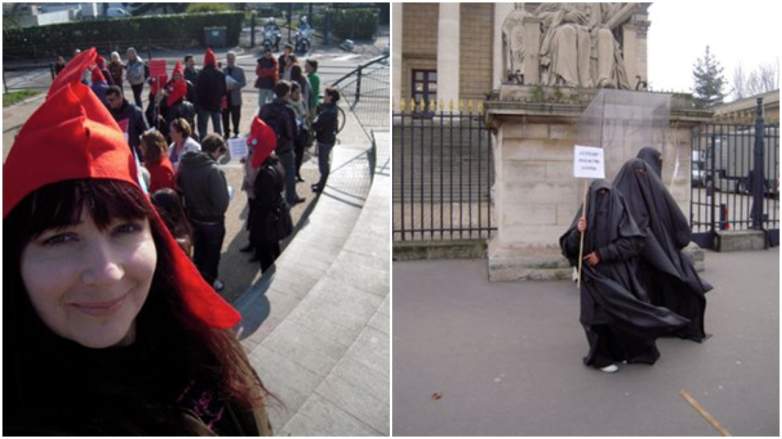
Sarah Braasch pictured at protests in France, including in a burqa outside of the French National Assembly.
Braasch has advocated for burqa bans in France and around the world, writing articles on the subject and protesting in the streets in Paris, including while wearing a burqa in front of the National Assembly.
“I am a First Amendment lawyer and a staunch church-state separatist. I surpass even my most progressive friends and colleagues in my unflinching and unwavering support of freedom of speech and expression, including religious expression,” she wrote in 2010 for the Freedom From Religion Foundation. “I support the anticipated public burqa ban in France, and I would support a public burqa ban in the U.S. In fact, I would support a global public burqa ban. (I will pause briefly for what I am sure are many gasps of incredulity.) … To me, the issue of whether or not the burqa/niqab is mandated by Islam is irrelevant. To me, in this instance, Islam is irrelevant. We don’t make laws based on Islamic doctrine or scripture or apocrypha or tradition or custom. We make laws based on secular principles and concerns and objectives. Likewise, Ni Putes Ni Soumises fights on behalf of secularism, gender equality and gender desegregation as the foundational elements of a truly egalitarian public space, in which all citizens participate as equals.”
She added, “Having turned my (nonexistent) soul inside out, looking for ulterior motives, I am comfortable with my stance on the burqa/niqab ban. It is a straightforward issue of public safety and security, coupled with democratic representation. Don’t let the discourse be hijacked by the cultural relativists and the obscurantists. That this seemingly benign issue gets so much media and political play is a direct result of our continued and ugly perception of women’s bodies as communal property.”
Braasch has also fought against hate crime laws. “I am pretty much the only person I know who hates hate-crime legislation as little more than bald-faced thought-crime legislation. I am not infrequently verbally vilified for asserting the claim that morality has no place in the law,” she wrote in the 2010 article. In 2011 she wrote a piece on Daylight Atheism titled, “Be Careful What You Wish For (Why I Hate Hate Crimes Legislation, But I Love Hate Speech).” She started her article with an anecdote about seeing a woman in a niqab on the UC Berekely campus, calling it “barbarism,” “brazen” and “a great shame,” and writing, “My views on public anti-mask laws (burqa bans, colloquially) as both public safety and gender desegregation measures are well known. We can no more tolerate gender segregation in the public space than we can tolerate racial segregation in the public space, above and beyond the simple fact that we can neither protect nor prosecute those whom we cannot identify, creating an untenable public safety and security hazard.” She said she wrote about that incident on Facebook and was accused of some of committing a hate crime against Muslims with her opinion.
On hate crime laws, she wrote:
For the rest of my life, if I should ever get into any kind of a dispute or altercation with anyone who claims to be Muslim, I could conceivably be prosecuted for a hate crime. My vehement anti-religion, and especially anti-Islam, ramblings on facebook, my personal blog, the Freedom From Religion Foundation’s website, and Daylight Atheism could be used against me in a court of law.
Hate crimes legislation is stupid. Seriously stupid. Abominably stupid. I hate hate crimes legislation. But, I love hate speech. Hate crimes legislation has a chilling effect on free speech and freedom of association. This is why hate crimes legislation is in direct contravention of the First Amendment of the US Constitution. Under hate crimes legislation, anyone who has ever said anything, which might be deemed hateful, directed at one of the groups protected under the legislation, opens themselves up to hate crimes prosecution in perpetuity, if they should ever find themselves in a dispute or altercation with someone who claims membership in any of those aforementioned protected groups. I want the haters out in the open, in the disinfecting sunlight of free and open discourse in the public marketplace of ideas. When people feel like their voices aren’t being heard, that’s usually when violence erupts. Thus, the paradox of hate crimes legislation. Hate crimes legislation couches the criminal penalty for hate speech within a crime of violence. But, in my opinion, nothing moves one to violence so much as being denied the right to speak one’s mind.
Hate crimes legislation is thought crime legislation. Hate crimes legislation criminalizes the motive behind a crime. Criminalizing the motive is criminalizing the why. Criminalizing the motive is criminalizing thoughts. A hate crime is an additional penalty, above and beyond the penalty imposed for whatever crime of violence. It is an additional penalty to punish the perpetrator for his/her motive. It is an additional penalty to punish the perpetrator for his/her thoughts, for his/her reason for having acted violently. This is thought crime. Pure and simple.
She also wrote about her view that race does not exist. “Human beings are real. Social groups aren’t. Not nations, not religions, not ethnicities, not cultures, and not races. Group identity is inherently arbitrary and illusory and fluid. There is no objective definition of a social group,” she wrote. “The experience of being a self-identified member of a social group is a wholly personal and subjective experience, which only exists in the mind of one or another group member.”
And in her Daylight Atheism article, she said, “There are a handful of misogynistic Islamists who occasionally try their hand at debating me on such subjects as US constitutional law and abortion rights on my NPNS facebook page. There’s little I enjoy more than publicly humiliating them online. In truth, I owe them no small amount of gratitude. Every time they bait me, and I engage them, my readership jumps precipitously. And, I relish the opportunity to vent a little of my barely contained rage.”
4. She Wrote ‘In a Democracy, in the Land of the Free, Who Are We to Tell People That They Can’t Be Slaves If They Want to Be’ & Called Racism a ‘Silly’ Social Construct
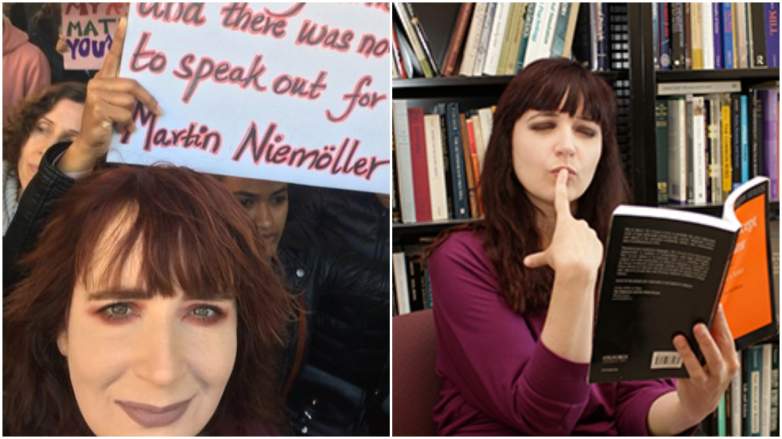
Sarah Braasch.
A post Braasch wrote in 2010 on The Humanist has also drawn attention after the Yale video went viral. In that post, Braasch wrote about winning a middle school debate by arguing the pro-slavery side:
I was placed on the pro-slavery side of the argument. I remember spending many an hour in the local public library poring over Time Life books. (The late 1980s were still a pre-Internet age.) It was during this period that I developed an insatiable appetite for history and began to devour history books of all shapes and sizes, as fast as I could read them. I thought that I would be able to unlock the mystery of human civilization, to gain a complete understanding of the world around me, and to peer far into the future of humankind. As an almost inexorable result, this was also when I began to loosen the tethers and fetters of religion from my wrists.
I read about the trials and tribulations of both escaped and freed slaves. I read about the cruel world waiting to pounce mercilessly upon penniless, illiterate, and uneducated former slaves. About how former slaves were torn from the stability of family and community and the paternalism of the slave owner (including the legal protections afforded slaves). About how former slaves struggled to rebuild their lives in a world that didn’t want them.
And then I had a eureka moment. Some—not many, but some—of the slaves didn’t want to stop being slaves. A small number wanted to remain with their owners or return even after being freed.
Braasch wrote that she realized she had won the debate with that argument.
“And indeed, I did. I led our team to victory,” she wrote in the 2010 post. “The pro-slavery contingent defeated the abolitionists because, in a democracy, in the land of the free, who are we to tell people that they can’t be slaves if they want to be? Who are we to tell someone that she has to be free? Who are we to tell someone that she has to be regarded as fully human? It doesn’t matter that the alternative to slavery, which would mean walking away from everything one had ever known to recreate life anew without any resources, was regarded as healthier and more dignified. It was still the individual’s choice to make.”
In a 2009 post on The Humanist site, she wrote, “the thing that I like the most about genealogy is that once you go back a handful of generations you realize that social constructs like racism and tribalism seem downright silly.”
5. Braasch Grew Up in the Jehovah’s Witness Faith & Has Written About Her Anti-Religion Views, Comparing Her Upbringing to Being a Slave
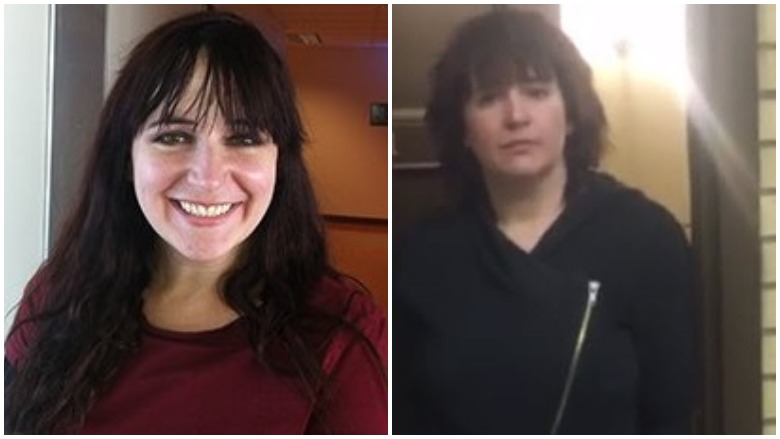
Yale University/FacebookSarah Braasch.
Braasch is a Minnesota native and has also lived in Wisconsin. She grew up in the Jehovah’s Witness faith and has written about how that experience impacted her anti-religion views. She said she has been estranged from her mother for more than 20 years because she left the religion. In her 2010 piece on The Humanist, Braasch compared her religious upbringing to being a slave.
“I was a slave who extolled the virtues of being a slave. I was a slave who insisted that I had chosen slavery of my own free will, of my own volition, as a conscious and educated choice. Because, you see, I was a Jehovah’s Witness who had been brainwashed from birth to believe that God had created me subhuman–below man,” she wrote. “I had been indoctrinated to accept this truth as part of God’s divinely ordained scheme for mankind (not humankind), to serve the men in my family and community, and nothing more. I had been inculcated to wait patiently for my post-Armageddon blessings in the hereafter or suffer the dire consequences in the here and now, including demonic attack.”
She added, “I decided that I didn’t want to hate myself anymore, no matter the cost. Even if it meant rejecting God’s plan for me. I chose to claim my humanity, my personhood, my human and civil rights. While I was still a teenager myself, I walked away from everything and everyone I had ever known. I made a new life for myself. A human life, not a subhuman, slave life. It was anything but easy and at times seemed like an impossible choice. I know that death and even suicide sometimes seemed easier. And now I think that maybe it shouldn’t have to be that hard to be human. Maybe we should make it a little easier to reject slavery.”
Braasch argued that religion is modern slavery:
The debate of our time is again about abolishing slavery. But this time it’s about abolishing the slavery of women, usually in the context of religion. It’s the same debate that was held in my middle school social studies class: should women get to “choose” to be slaves in a secular, liberal, constitutional democracy? This time, however, I don’t want to argue for the pro-slavery contingent.
We have decided that we won’t let human beings choose slavery as a result of their skin color, but we permit women to do so in the context of religion. I have been dumbstruck and dismayed by the lengths to which even my ostensibly freethinking peers will go in defense of a woman’s “choice” to be a slave, especially with respect to the free exercise of religion. I chalk most of it up to our deeply rooted notions of women as the sexual and reproductive chattel of their families and communities. Most recently, this debate has reared its head in Western Europe in the form of proposed public burqa bans in France, Belgium, and Spain.
“As a devoted defender of the right to free speech, even I am willing to concede that freedom of expression isn’t unlimited. Compelling government interests may justify impinging upon fundamental rights and still lie within the constraints of constitutionality. Reasonable people can and do disagree about whether identity obscuring face coverings in the public space should be protected as free speech and in which contexts and to what extent. Ultimately, this is a question for legislators and courts,” Braasch continued. “Additionally, and personally, I would argue that women’s emancipation is a compelling government interest that justifies impinging upon the right to anonymous public speech (via an identity-obscuring face covering), if such a right exists. Gender equality and desegregation should be as compelling an interest to the government as diversity. (Unfortunately, American jurisprudence has yet to catch up with me on this point.) No liberal constitutional democracy can survive for long with a de facto multi-tiered hierarchy of citizenship. In other words, no one gets to ‘choose’ to be a slave.”
She wrote she grew up in an “abusive Jehovah’s Witness home,” and her parents would tell her they were under the “threat of demonic attack,” with Armageddon possible at any time. She said her father was also abusive and she took him to court to get a restraining order and file for financial independence as a teenager.
Braasch wrote that her upbringing left her unprepared for college life.
“I was socially retarded. I was completely alone. I felt totally disconnected from the university community,” she wrote. “Interpersonal interactions were difficult and uncomfortable for me. I had trouble making eye contact. And, I thought demons were stalking me.”
Braasch said she stayed on campus during school breaks, spending hours in common areas and watching TV and talking to overnight security guards. She said while at Minnesota she “presented as a normal face” to other students, while seeking out “other outsiders,” as her friends, like a “goth transvestite” and a “Jamaican bisexual dancer.”
She has also talked about her own issues with mental health, including a breakdown while living in Berkeley that included suicidal thoughts.
“I was racking up prizes and awards and scholarships and fellowships and internships and whatever other honors I could get my hands on. I wanted medals and certificates and esteem. Mostly esteem. I was fueled by rage and hatred. Hatred and rage,” she wrote. “I am not unintelligent. I am not crazy. I have two engineering degrees and a law degree. I have traveled the world. I am well educated and well read. I am a human rights activist. I am a writer. I am an adult survivor of childhood religious abuse.”
Articles by Braash, who deleted her Facebook, Twitter and Instagram accounts after the video went viral, have been removed from The Humanist’s website. The site’s editors issued a statement saying, “We have removed Sarah Braasch’s article, ‘Original Intent’ (published in 2009), after finding it racially offensive. The article was a commentary on the Puritanical dogma and religious tyranny in colonial America, making the case that our nation was founded on principles antithetical to such oppression. However, the author’s interjection that racism is a ‘silly’ social construct renders this article out of step with our commitment to social justice and to the pressing need to be realistic about the racism that permeates our culture today. We regret not seeing this problem sooner and appreciate readers bringing it to our attention.”
The editors added, “We have removed the article “Lift the Veil, See the Light” by Sarah Braasch (published in the Sept/Oct 2010 issue of the Humanist magazine) from our website after it was brought to our attention that it contains racially offensive argumentation. The article was part of a point-counterpoint on the topic of laws barring Muslim women in France from wearing face-covering veils. In the article in question, which argues for the ban, the author equates the small number of slaves who wanted to remain with their owners after emancipation (an idea that is itself still a justification for racism in some circles) with women who choose to be “slaves” in abusive, misogynistic, or otherwise patriarchal religious traditions. She makes this analogy–which we have judged to be inaccurate and racially offensive–to argue that if human beings are forced or conditioned to accept indignity, suffering, and an inferior position in society then that society has an obligation to make laws to correct that. While the author’s final point is one some humanists might champion, the analogy to American slavery is definitely not.”
The statement said, “The Humanist published two articles from this author as an outside contributor (not a staff member or regular blogger). We regret that this material remained up as long as it did and appreciate its offensive content being brought to our attention.”
